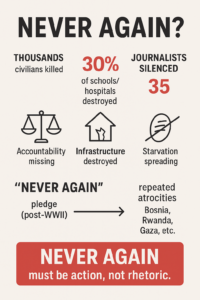Never Again: When Words Lose Weight
Narrative Article
“NEVER again. And yet, here we are. Again.” These words weigh heavy today, nearly eight decades after humanity’s vow never to repeat its worst crimes. As conflict escalates in Gaza, the phrase has become a haunting reminder—not of lessons learned, but of promises broken. The world’s moral compass wavers under euphemisms, semantic distractions, and the failure to confront destruction for what it is: deliberate, systemic, and relentlessly dehumanizing.
Overview
The call of “Never again” once carried the force of collective resolve. But as violence unfolds again, the phrase risks becoming empty rhetoric. What was meant to safeguard the sanctity of human rights now risks being a hollow echo—unless we reclaim its urgency and become active guardians against atrocity.
Notes
- Mass suffering is often obscured by debates over semantics—defining catastrophes from genocide to ethnic cleansing diminishes urgency.
- Destruction of people’s lives extends beyond killings; cultural annihilation, starvation, environmental ruin, and silencing of intellectuals are equally devastating.
- The phrase “Never again” is powerful only if backed by accountability, collective action, and moral clarity—not watered down in diplomatic niceties.
- Societies must confront history, teach its lessons, and resist the normalization of brutality.
- Without vigilance and international will, “Never again” is more a lament than a promise.

Relevant CSS Syllabus / Subjects
- International Relations: Understanding genocidal definitions, responsibility to protect, international norms.
- Current Affairs: Humanitarian crises, Palestine–Israel conflict, media silencing, environmental collapse.
- Essay Paper: Structure topics on genocide, failure of international systems, moral responsibility in global politics.
- Pakistan Affairs: Lessons in minority protection, media freedom, and responsibility to confront rights violations.
Notes for Beginners
Think of “Never again” like a promise your school makes after bullying gets out of hand—you swear it won’t happen again. But if you don’t teach kindness, support victims, and punish bullies, it becomes just a motto on school walls. At the global level, “never again” needs action—speech without it rings empty.
Facts and Figures
- Tens of thousands of civilians, including thousands of children, have lost their lives.
- Cultural infrastructure—homes, schools, healthcare facilities—has been destroyed at catastrophic scale.
- Starvation, sickness, poisoned lands, and silenced journalists deepen the erasure of a people’s existence.
- Each day of inaction, each euphemism employed, chips away at the promise of “Never again.”
Conclusion
“Never again” must remain not a lament, but a compass. It demands addressing atrocities in full moral clarity—without niceties or evasions. For CSS students and future leaders, it’s a call: to remember, to resist, and to ensure history does not repeat itself through indifference.

